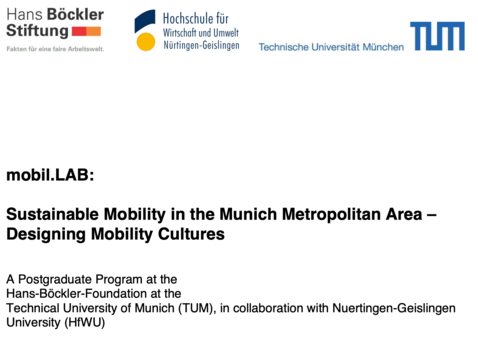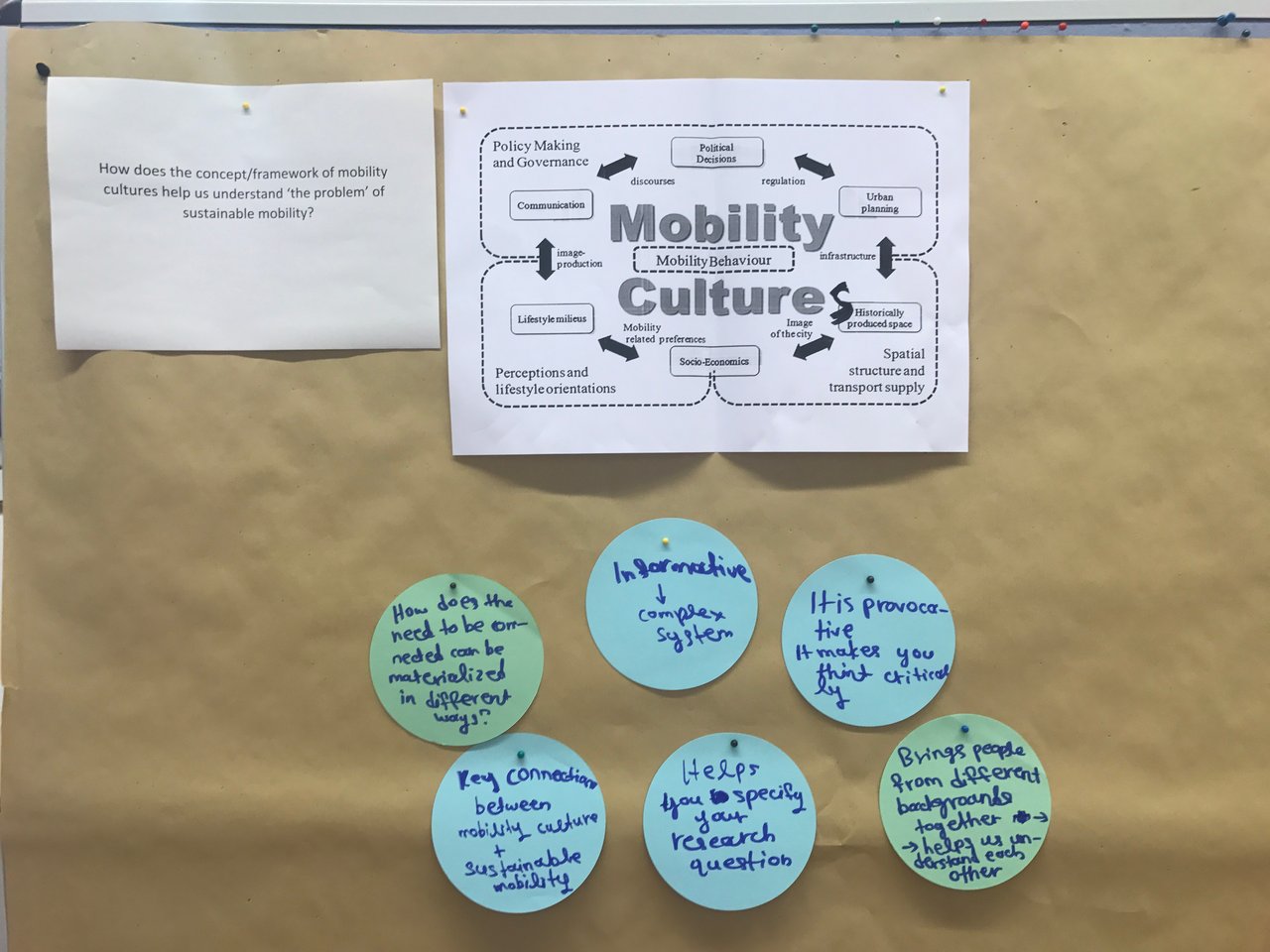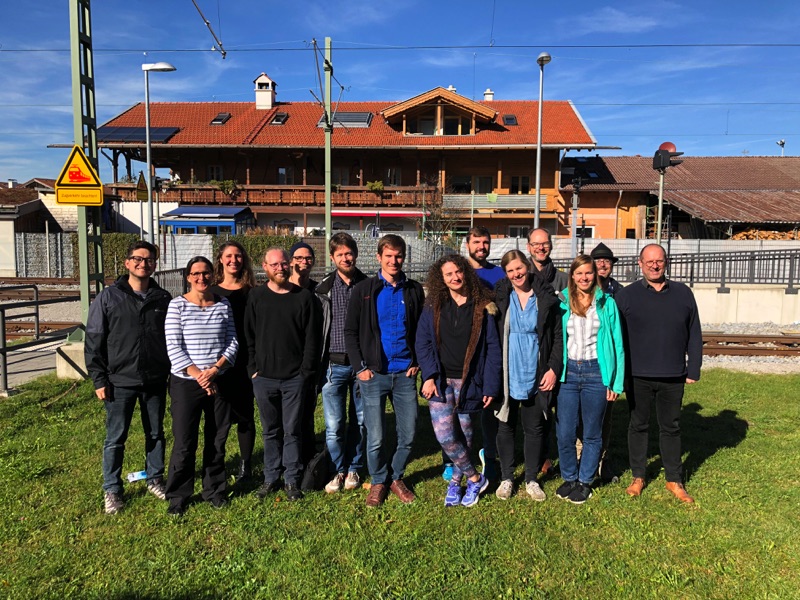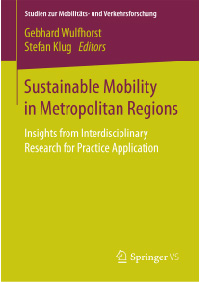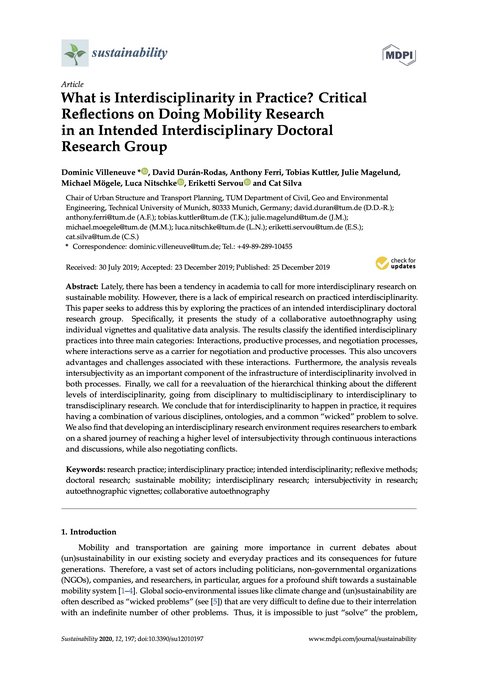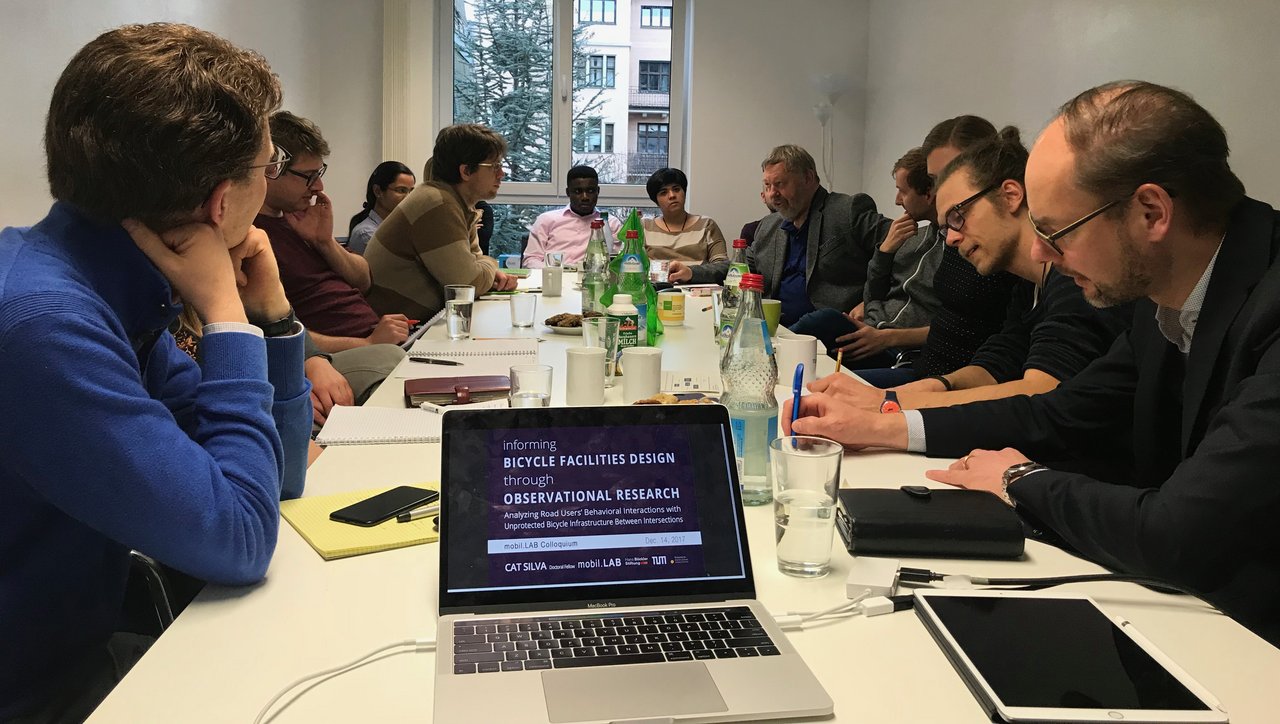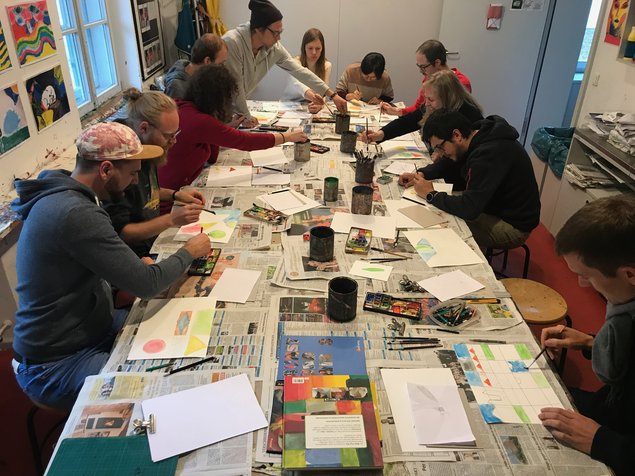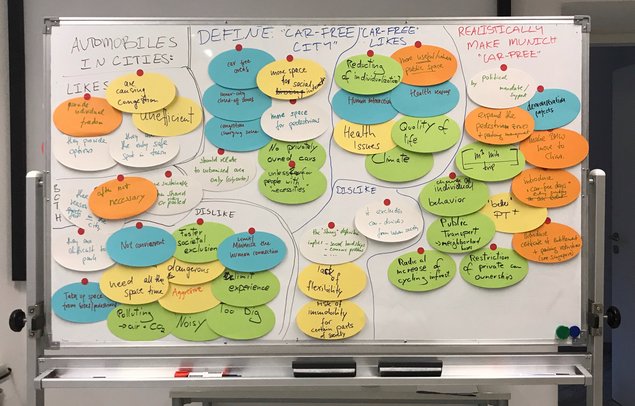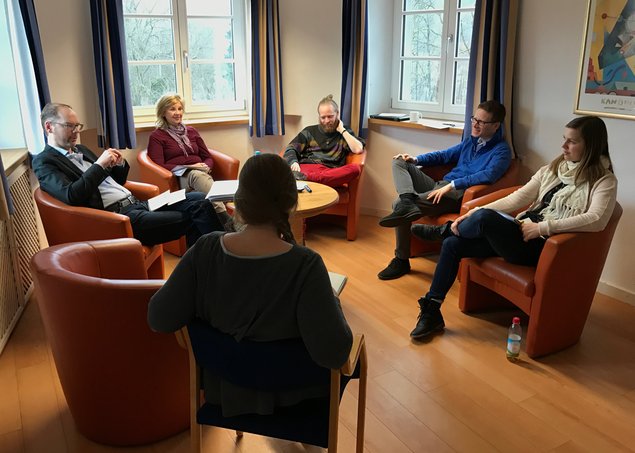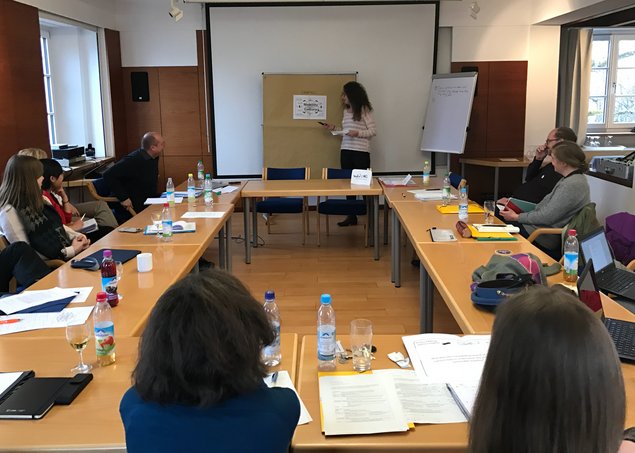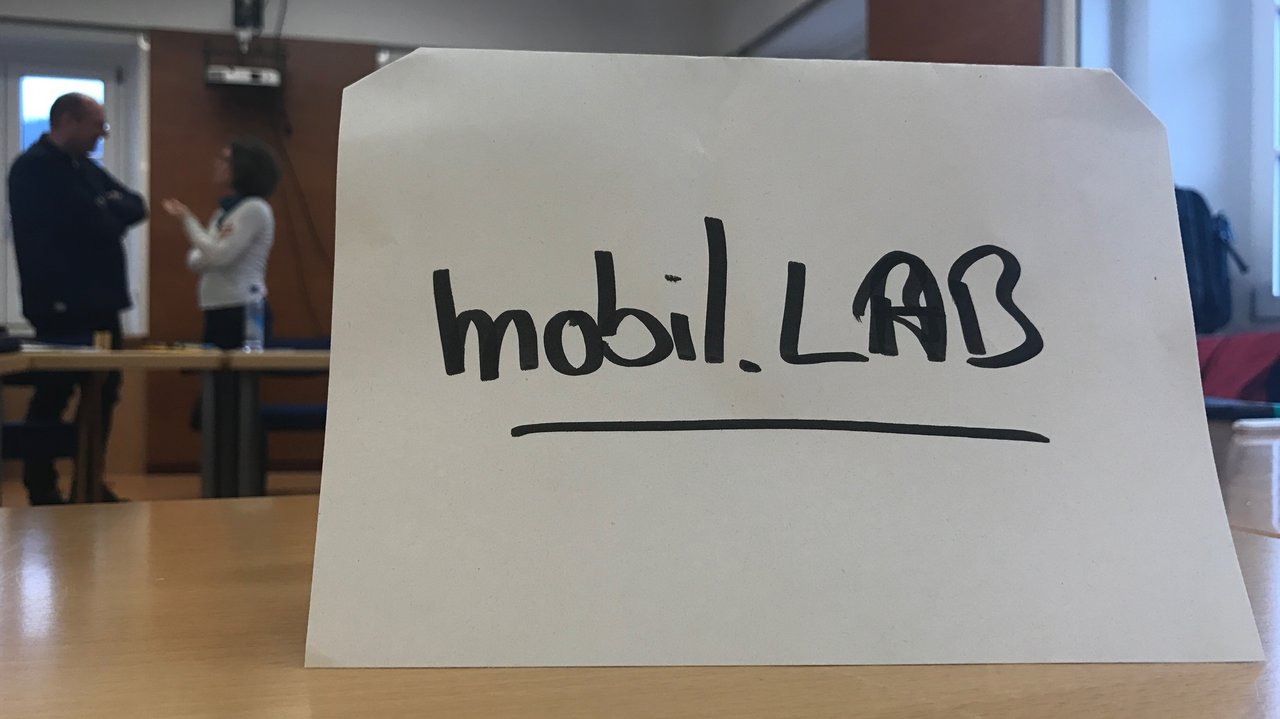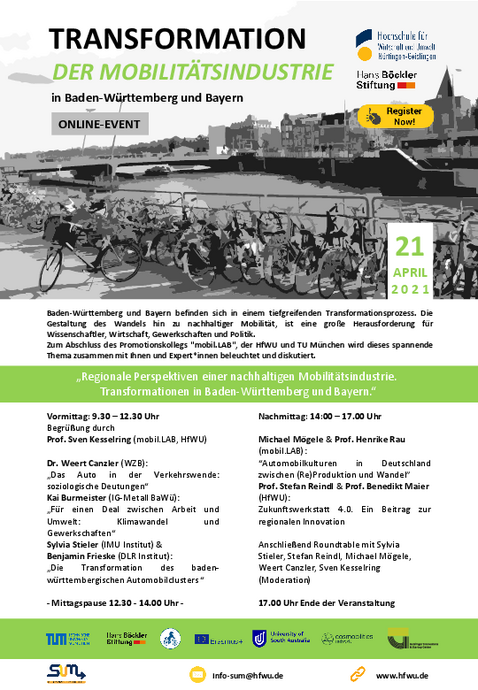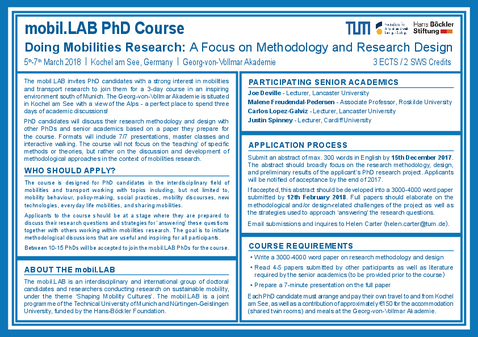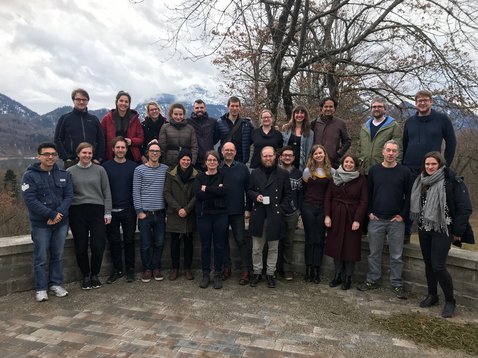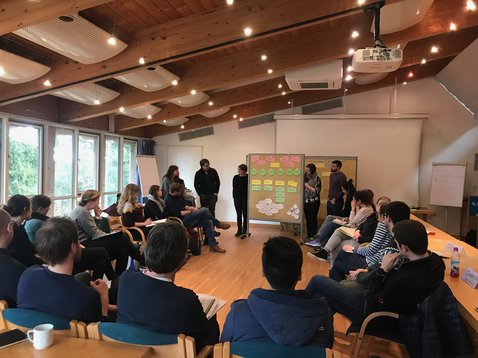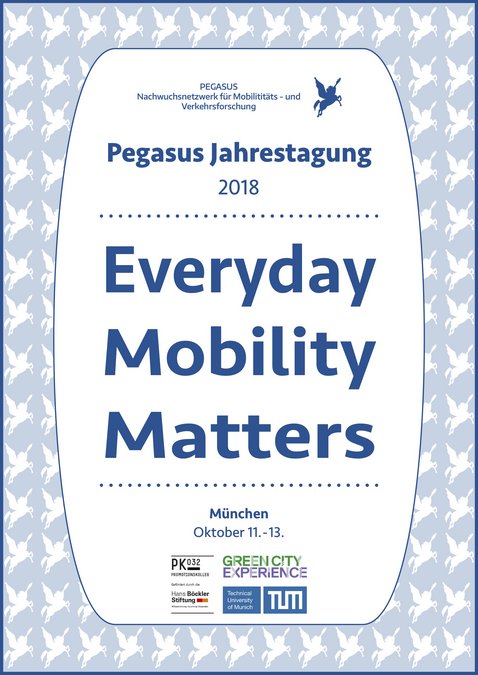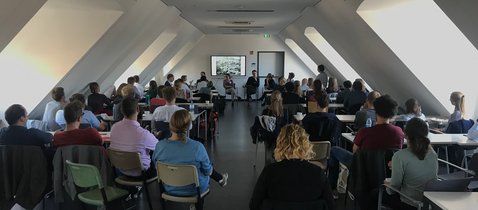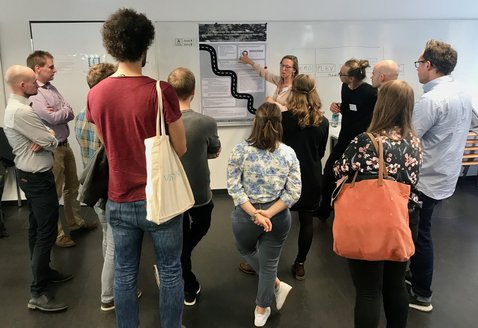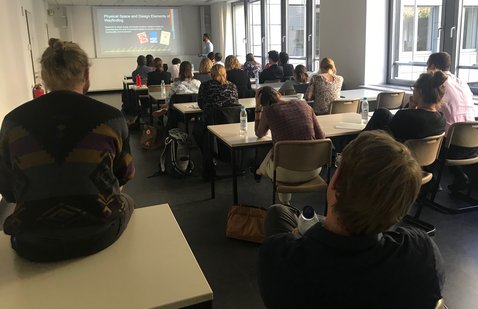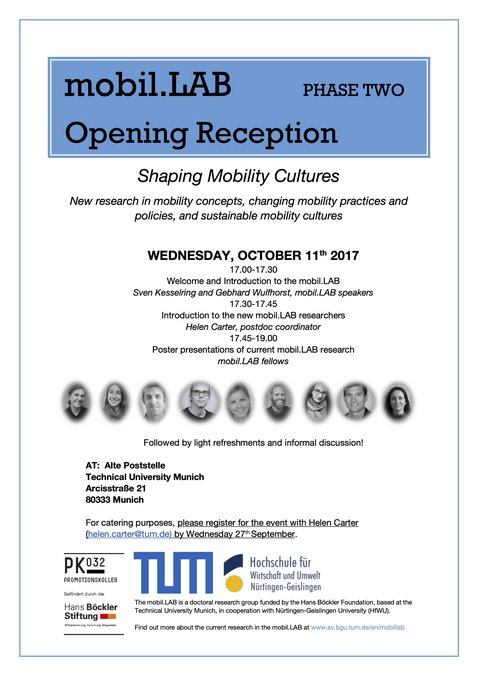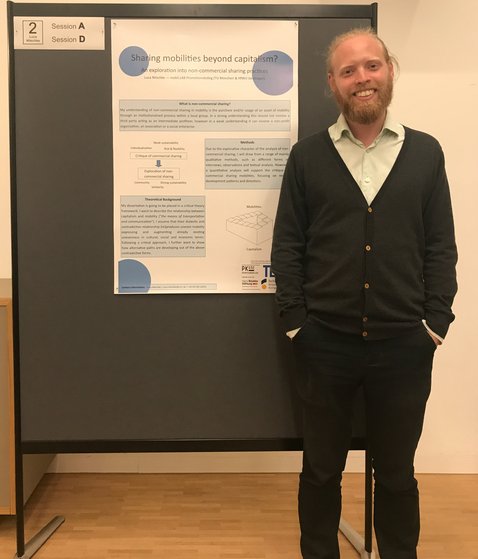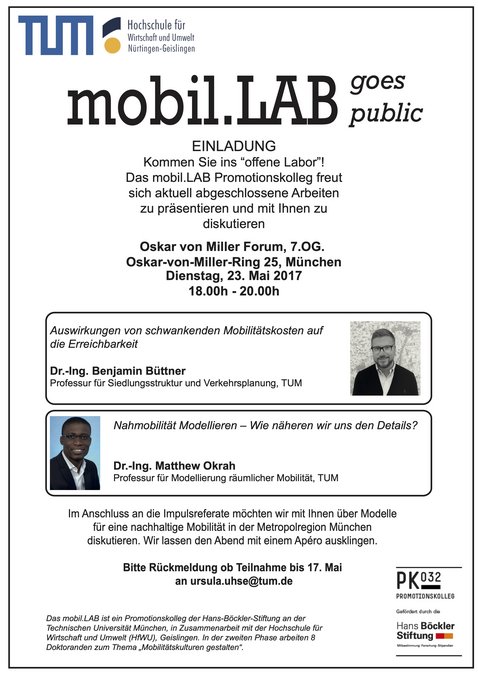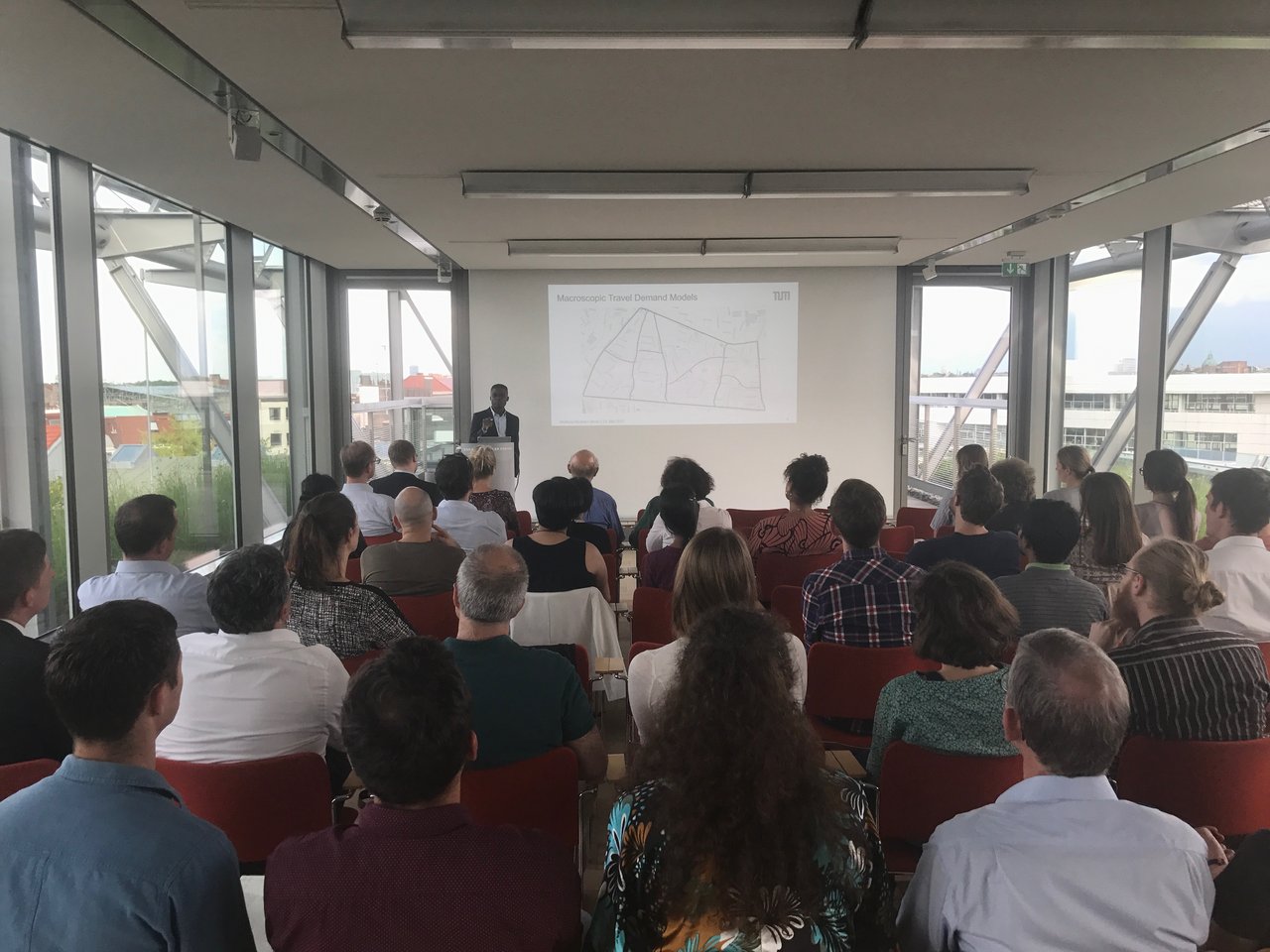The mobil.LAB Doctoral Research Group was a unique interdisciplinary and international group of doctoral candidates and researchers conducting research on the theme of sustainable mobility in the metropolitan region of Munich. Our research group was a joint programme of the Technical University of Munich (TUM) and Nürtingen-Geislingen University (HfWU), funded by the Hans Böckler Foundation (HBS).
The mobil.LAB focused on high-quality doctoral research in a unique academic environment, where exchange between the members of the group, the associated researchers, and with external academics and professionals is important. Our activities include regular colloquia and seminars, PhD workshops, conferences, public lectures and policy workshops. By design, the mobil.LAB was an interdisciplinary research group created with the hopes that the interactions between researchers from varied scientific disciplinary backgrounds would help towards finding solutions to the wicked problem of making urban mobility more sustainable.
The research group was set up in 2011, and began its second phase with a new generation of fellows starting from October 2016. With our second generation of doctoral fellows complete their research projects, the activities of the mobil.LAB concluded in 2021.
The interdisciplinary nature of the mobil.LAB Doctoral Research Group gives us a variety of different perspectives on our themes, and helps create some dynamic discussions both within the group and with external partners. The research topics of the group focus on mobility cultures, transport, housing, urban planning and structure, sharing economies, spatial modelling and more. These various areas of focus in the fellow's projects reflects the different backgrounds of our researchers. Each project was situated within and across disciplines such as engineering, sociology, geography, political science, environmental studies and urban planning, however all projects relate to the overall framework of Shaping Mobility Cultures.
The framework of the second phase of the mobil.LAB is Shaping Mobility Cultures. This takes into account the need for a profound change of perspective from transport to mobility. The research programme is divided into four research areas:
- New mobility concepts
- Changing mobility practice
- Transition from transport to mobility policies
- Sustainable mobility cultures
You can read the full conncept for second phase here. Find the German version here.
The mobil.LAB was established in 2011 as a doctoral research group working closely together with professors and researchers active in the field of transport and mobility in the Munich Metropolitan Region. Our group was based around PhD fellows financed by stipends from the HBS. We also invited a number of associated PhD fellows working within our framework from TUM and HfWU, and these fellows were also involved in and contribute to mobil.LAB activities. In total, 27 doctoral fellows and 4 poct-doc research investigated various themes of sustainnability mobility in the mobil.LAB. The day-to-day activities were coordinated by 4 post-docs and 2 doctoral fellows and managed by 3 professors serving as Speakers for the research group. These people contributed to guiding the research of the group, organising and facilitating events, and aim to build a fruitful and supportive academic environment.
Prof. Dr.-Ing. Gebhard Wulfhorst
Chair for Urban Structure and Transport Planning
Technical University of Munich
Speaker for Phases 1 and 2
Prof. Dr. Sven Kesselring
Nürtingen-Geislingen University
Speaker for Phases 1 and 2
Prof. Dr.-Ing. Regine Gerike
Technical University of Dresden
Speaker for Phase 1
Prof. Dr.-Ing. Fritz Busch
Department of Traffic Engineering and Control
Technical University Munich
Prof. Dr. Malene Freudendal-Pedersen
Department of Planning
Aalborg University
Prof. Dr.-Ing. Robin Ganser
Spatial Planning, Urban and Rural Development
Nürtingen-Geislingen University
Prof. Dr. Sabine Maasen
Professorship for Science and Innovation Research
Universität Hamburg
Prof. Dr.-Ing. Rolf Moeckel
Rudolf Mößbauer Assistant Professor, Modelling Spatial Mobility
Technical University Munich
Prof. Dr. Monika Popp
Research and Teaching Unit in Human-Environment Relations
Ludwig-Maximilians-Universität München
Prof. Dr. Henrike Rau
Research and Teaching Unit in Human-Environment Relations
Ludwig-Maximilians-Universität München
Prof. Dr. Claus J. Tully
Free University of Berlin
Prof. Dr. Alain Thierstein
Urban Development
Technical University Munich
Prof. Dr.-Ing. Stefan Reindl
Automotive Economy
Nürtingen-Geislingen Universit
Post-doc Coordinators
Dr. Stephan Klug
Dr. Helen Carter
Prof. Dr. Dominic Villeneuve
Affiliated Post-Doc Researcher
Dr.-Ing. Matthias Spangler
Doctoral Fellow Coordinators
Torsten Belter
Dipl.-Verk.wirtsch.
Cat Silva
M.A. Urban Planning, M.A. Public Administration
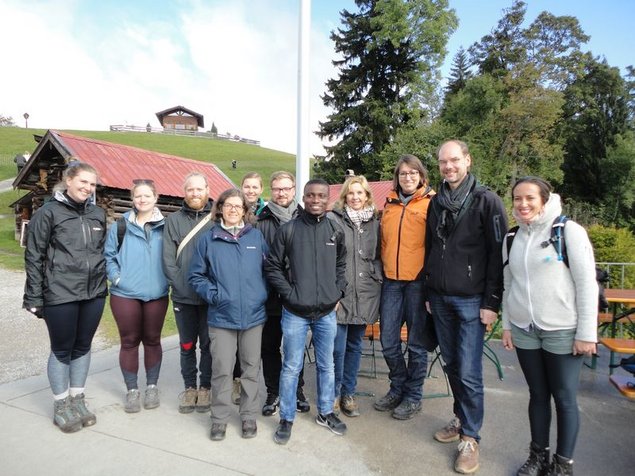
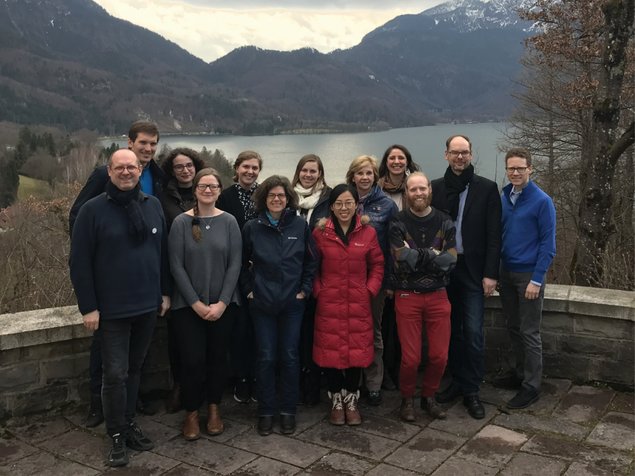
Fellows from the First Phase | |
HBS Scholarship Recipients | Associated Fellows |
| Dr.-Ing. Matthew Bediako Okrah Torsten Belter Dr. sc. tech. Johanna Kopp Dr. phil. Jessica Le Bris Dr. rer. pol. Diem-Trinh Le-Klähn Dr. Katrin Roller Magdalena Schippan Dr.-Ing. Lena Sterzer Dr. Chelsea Tschörner-Budde | Dr.-Ing. John Erik Anderson Dr.-Ing. Benjamin Christoph Büttner Dr.-Ing. Friederike Hülsmann Dr.-Ing. Miramontes Montserrat Dr.-Ing. Juanjuan Zhao |
Fellows from the Second Phase | |
HBS Scholarship Recipients | Associated Fellows |
| David Durán Rodas Anthony Ferri Tobias Kuttler Julie Magelund Michael Mögele Dr. phil. Luca Nitschke Dr. phil. Eriketti Servou Cat Silva | Dr.-Ing. Christian Assmann Gabriele Harrer-Puchner Dr.-Ing. Julia Helen Kinigadner Nico Kühnel Qin Zhang |
All mobil.LAB research fellows proposed and worked on individual research projects on topics related to sustainable mobility approved by the HBS and the Speakers and Coordinators of the mobil.LAB. In addition to working on their individual work, the fellows involved in the first and second phase joined to publish texts reflecting on indiciplinary practices in sustainable mobility research. Below, you can learn about a higlighed shared project of the two phases as well as learn about the individual research conducted by the mobil.LAB doctoral research fellows.
mobil.LAB Projects
In the first phase, the 9 of the HBS-funded and associated fellows contributed a chapter to a published book edited by a mobil.LAB Speaker and Coordinator that provided their various perspectives on and shared understanding of sustainability mobility. All 8 HBS-funded doctoral fellows from the second phase published an article with the mobil.LAB Coordinator that presented their collective autoethnographic reflections on the interdiciplinary processes which influenced how each researcher approached their individual projects.
Learn more about both works below.
"Sustainable Mobility in Metropolitan Regions: Insights from Interdisciplinary Research for Practice Application"
The work of nine doctoral fellows, the two speakers and one coordinator from the first phase of the mobil.LAB was published in 2016 in the book Sustainable Mobility in Metropolitan Regions (Wulfhorst & Klug (eds.), 2016). The book highlights themes around sustainable mobility, such as sustainable modes, regional governance and spatial analysis. These themes are examined in the case of the metropolitan region of Munich. The book also deals with the general understanding of sustainable mobility within the mobil.LAB, and points towards the mobil.LAB's second phase through a discussion of mobility cultures.
Book Content
Chapters by mobil.LAB Fellows:
"Policies to Achieve Environmental Goals in the Built Environment"
Dr.-Ing. John Erik Anderson
"Handling Non-Motorized Trips in Travel Demand Models"
Dr.-Ing. Matthew Bediako Okrah
"Sharp Increases in Mobility Costs: A Trigger for Sustainable Mobility"
Dr.-Ing. Benjamin Christoph Büttner
"Pedelecs as New Tools for Active Mobility: ‘Cheating’ or Sustainable Transportation?"
Dr. phil. Jessica Le Bris
"Sustainable Tourist Mobility: Implications for Urban Destination Management"
Dr. rer. pol. Diem-Trinh Le-Klähn
"Corporate Mobility: When and Why Does it Become a Burden?"
Dr. Katrin Roller
"Social Sustainability and Mobility: The Case of Low-Income Groups"
Dr.-Ing. Lena Sterzer
"A Governance Approach to Sustainable Mobility"
Dr. Chelsea Tschörner-Budde
"‘Knowledge-Workers’: A Conceptual Framework on Commuting Patterns"
Dr.-Ing. Juanjuan Zhao
Chapters by mobil.LAB Speakers and Coordinator:
"Sustainable Mobility in the Metropolitan Region of Munich: An Introduction"
Prof. Dr.-Ing. Gebhard Wulfhorst (editor)
"Perspectives on Sustainable Mobility in Metropolitan Regions: Shaping Mobility Cultures"
Prof. Dr. Sven Kesselring
"Individual Contributions Toward a Common Objective"
Dr. Stephan Klug (editor)
"What is Interdisciplinarity in Practice? Critical Reflections on Doing Mobility Research in an Intended Interdisciplinary Doctoral Research Group"
The eight HBS-funded doctoral fellows and post-doc coordinator of the mobil.LAB wrote and published an article in a special issue of Sustainability dedicated to the topic of “Sustainable Mobility: Interdisciplinary Approaches” in 2020. This work presents the researcher's critical reflections on the how the interdiciplinary set-up and daily practices of the mobil.LAB Doctoral Research Group influenced the outcome of individual research on complex topic of sustainability mobility. The article presents three interdiciplinary processes that can both work to deepen the research while also act as barriers or discuptions. A main goal of the work is to provide an empirical perspective for others working in or seeking to establish successful interdiciplinary research groups investigating 'wicked' topics.
Abstract:
Lately, there has been a tendency in academia to call for more interdisciplinary research on sustainable mobility. However, there is a lack of empirical research on practiced interdisciplinarity. This paper seeks to address this by exploring the practices of an intended interdisciplinary doctoral research group. Specifically, it presents the study of a collaborative autoethnography using individual vignettes and qualitative data analysis. The results classify the identified interdisciplinary practices into three main categories: Interactions, productive processes, and negotiation processes, where interactions serve as a carrier for negotiation and productive processes. This also uncovers advantages and challenges associated with these interactions. Furthermore, the analysis reveals intersubjectivity as an important component of the infrastructure of interdisciplinarity involved in both processes. Finally, we call for a reevaluation of the hierarchical thinking about the different levels of interdisciplinarity, going from disciplinary to multidisciplinary to interdisciplinary to transdisciplinary research. We conclude that for interdisciplinarity to happen in practice, it requires having a combination of various disciplines, ontologies, and a common “wicked” problem to solve. We also find that developing an interdisciplinary research environment requires researchers to embark on a shared journey of reaching a higher level of intersubjectivity through continuous interactions and discussions, while also negotiating conflicts.
List of Authors
Prof. Dr. Dominic Villeneuve (first author)
David Durán Rodas
Anthony Ferri (editor)
Tobias Kuttler
Julie Magelund
Michael Mögele
Dr. phil. Luca Nitschke
Dr. phil. Eriketti Servou
Cat Silva (editor)
Reference: Villeneuve, D.; Durán-Rodas, D.; Ferri, A.; Kuttler, T.; Magelund, J.; Mögele, M.; Nitschke, L.; Servou, E.; Silva, C. What is Interdisciplinarity in Practice? Critical Reflections on Doing Mobility Research in an Intended Interdisciplinary Doctoral Research Group. Sustainability 2020, 12, 197. https://doi.org/10.3390/su12010197
Individual Research
To date, 14 doctoral thesis have been completed by research fellow in the mobil.LAB. We expect to graduate over 20 doctoral fellows when our current researchers complete their dissertations.
You can scroll through the details and abstracts of all doctoral thesis written in the mobil.LAB Doctoral Research Groups below, presented alphebetically by year complete below.
Expected
“Data-driven and equity-based implementation of bike-sharing systems: A built and social environment approach”
Author: David Durán Rodas
Supervisors: Prof. Dr.-Ing. Gebhard Wulfhorst (TU München); Prof. Dr. Francisco Camara Pereira (DTU)
“Making the Connection: Understanding Emotional and Sensorial Responses in Public Transit”
Author: Anthony Ferri
Supervisors: Prof. Dr.-Ing. Gebhard Wulfhorst (TU München); Dr. Monika Popp (LMU)
“New Ways to Mobility Concepts based on Biocybernetic Systems Modelling and Simulation”
Author: Gabriele Harrer-Puchner
Supervisor: Prof. Dr.-Ing. Gebhard Wulfhorst (TU München)
“Mobile Spaces and the Politics of Urban Sustainability and Inclusion in the Global South. Whose Commons are we talking about?”
Author: Tobias Kuttler
Supervisors: Prof. Dr. Sabine Maaßen (Universität Hamburg); Prof. Dr. Sven Kesselring (Nürtingen-Geislingen University)
“Agent-Based Model Analysis of the interaction between Land-Use, Transport and Noise”
Author: Nico Kühnel
Supervisor: Prof. Dr.-Ing. Rolf Moeckl (TU München)
“Political Wheels in Motion: Spaces of mobility politics negotiating the future of the automobile industry in Southern Germany”
Author: Michael Mögele
Supervisors: Prof. Dr. Henrike Rau (LMU); Prof. Dr. Sven Kesselring (Nürtingen-Geislingen University)
“Understanding Interactions in the Bicycle Lane: A Grounded Theory-Driven Observational Method for Documenting Behavior and Analyzing Infrastructure Functionality”
Author: Cat Silva
Supervisors: Prof. Dr.-Ing. Rolf Moeckl (TU München); Prof. Dr.-Ing. Kelly Clifton (Portland State University)
“Incorporate Pedestrian Modelling with a Microscopic Integrated Land Use and Transport Model to Assess Health Benefit”
Author: Qin Zhang
Supervisors: Prof. Dr.-Ing. Rolf Moeckl (TU München); Prof. Dr.-Ing. Kelly Clifton (Portland State University)
2020
“System Analysis of the impacts of On-Demand Mobility-Services in the context of sustainable urban mobility”
Author: Dr.-Ing. Christian Assmann
Supervisors: Prof. Dr.-Ing. Gebhard Wulfhorst (TU München); Prof. Dr. Claus J. Tully (TU Berlin)
Link to full text: https://mediatum.ub.tum.de/1552214
Abstract: The research project investigates the effects of on-demand mobility services on sustainable urban mobility using the city of Munich as a case study area. By applying the methods System Thinking and System Dynamics, the effects on traffic, air emissions and space are modelled in selected future scenarios and, based on the results, concrete recommendations for implementation are developed.
“Carbon-based accessibility analysis: Characteristics, operationalization, theoretical basis, and practical relevance of a planning tool for low carbon mobility options”
Author: Dr.-Ing. Julia Helen Kinigadner
Supervisors: Prof. Dr.-Ing. Gebhard Wulfhorst (TU München)
“Sharing mobilities beyond capitalism?: An exploration into non-commercial sharing practices in mobilities”
Author: Dr. des. Luca Nitschke
Supervisors: Prof. Dr. Sabine Maaßen (Universität Hamburg); Prof. Dr. Sven Kesselring (Nürtingen-Geislingen University)
Abstract: Mobility is a core element of capitalist societies in which mobilities of humans, goods, data and ideas are keeping the process of capitalist expansion and accumulation afloat. However, the constant growth of mobilities, driven by a logic of faster, further and more, increasingly impairs the natural and social environment through a lack of livable space, air pollution, long-distance commuting and the escalating climate and ecological crisis. Therefore, a transition towards more social and ecological practices of mobility is urgently necessary.
My dissertation is about a part of this transition in relation to the mobility of people and investigates how practices of non-commercial carsharing are influencing local everyday mobility. I argue that practices of non-commercial carsharing are reconstituting hegemonic practices of automobility through a process of everyday resistance and thereby challenge capitalist mobilities in the realm of everyday life. Non-commercial carsharing reconstitutes practices of automobility along four aspects: 1) Redefine the meaning of the car and automobility 2) Reembed automobility into its environmental context, 3) Foster sociality, and 4) Change ownership relations. First, for non-commercial carsharers the car becomes an object of utility and looses its role as status symbol. This changing role of the car brings the coercive aspects of automobility to the fore, which are widely recognized by non-commercial carsharers. Thereby, automobility isn’t the sole means of liberation anymore, but rather ridden with ambivalence, fostering a reduction of its use. Second, non-commercial carsharing is often practiced with an awareness of the environmental damages of automobility. Based on this awareness manifold critiques of automobility, mainstream sharing and consumerism become articulated. Thereby, automobility is re-embedded into its societal and environmental context and non-commercial carsharing emerges as counter-hegemonic practice. Third, non-commercial carsharing fosters sociality and community. While automobility is mainly aligned with individual movement and atomization, non-commercial carsharing is characterized by collective care, responsibility and voluntary engagement. While this works against individualizing tendencies of capitalism it also enables the collective alteration of the reproduction of social structures through collective agency. Fourth and last, new ownership relations emerge from non-commercial carsharing. Through a process of commoning mobility individual car ownership is replaced by actual and perceived shared car ownership and collective management and care.
Overall these four aspects result in reducing car usage, and move mobility away from the hegemony of automobility and private car ownership. Through collectively altering the reproduction of hegemonic practices of automobility in a process of everyday resistance, non-commercial carsharing is challenging capitalist mobilities in the realm of everyday life. Thereby, non-commercial carsharing shows a potential pathway for a socio-ecological just and post-capitalist mobility transition.
“Automated driving in the policymaking: The productivity of the void”
Author: Dr. des. Eriketti Servou
Supervisors: Prof. Dr. Sabine Maaßen (Universität Hamburg); Prof. Dr. Sven Kesselring (Nürtingen-Geislingen University)
Link to full text: https://mediatum.ub.tum.de/1553212
Abstract: During the past decade, automated driving has gained momentum in terms of its potential to transform urban mobility. Automated driving is not a ready-made technology, but a socio-technical process in the making. As such, its potentials are ambivalent and they come along with challenges, which call for new policies and regulations. These challenges have to do with it being inextricably entangled with the dynamics of different socio-technical systems, such as the system of automobility, the system of ICT and public transport as well as with multi-level governance settings. Thus, it has been shaping through a diversity of industrial, technological and administrative arrangements. The interplay of these arrangements creates uncertainty and ambiguity regarding how to plan for its implementation, resulting in an institutional void in policymaking, as there are not pre-defined rules of how to handle it. What will happen and to what effect is to be determined by policymaking. Policymaking is the process through which the different arrangements are gathered, interact and ultimately define what will become of automated driving.
This dissertation examines how automated driving is produced in policymaking and what kind of impacts this production has for mobility. To do so, it develops an analytics of studying policymaking by redeveloping the concept of storylines as an analytical lens. Storylines allow for studying the historically emergent and dynamic processes through which actors, technologies, practices, narratives and settings interact and produce policy developments. The concept brings a balance between the interpretation of developments and their performativity; that is how these developments emerge and play out. Thus, it allows for a comprehensive study of the contingencies and uncertainties of policymaking as well as their outcome and potential for future mobility. Based on different qualitative methods, such as interviews, document analysis and participant observation of events, the policymaking of automated driving is analysed in two case studies. The first case study of Munich unfolds policymaking as a trajectory of dispersion of automated driving from car-centric incremental automation in industrial and federal settings to diverse mobility services at the urban level. The chapter shows how automated driving opens up new perspectives for rethinking long-existing urban issues, such as urbanisation and lack of space, without it being implemented. The second case study of Stuttgart presents a trajectory of relegation of automated driving from a connected transport system as a strategy of economic restructuring of the State Baden-Württemberg to a proxy for on-demand public transport at the urban level. The chapter eventually shows how automated driving as a proxy induced policy change in favor of public transport.
Overall, both cases reflect the potentials of the non-implementation of automated driving on mobility policymaking through two distinct approaches: an industry-focused approach and an urban approach. The dissertation concludes by abstracting these potentials in regard to the institutional void and uncertainty. Ultimately, defensive responses to uncertainty, such as non-implementation of a certain technology, might fill in the void productively by enacting new understandings and solutions when technology is contextualized at the urban level.
2018
“Assessment of Mobility Stations: Success factors and contributions to sustainable urban mobility”
Author: Dr.-Ing. Miramontes Montserrat
Supervisors: Prof. Dr.-Ing. Gebhard Wulfhorst (TU München); Prof. Dr. Regine Gerike (TU Dresden)
Link to full text: https://mediatum.ub.tum.de/1446304
Abstract: This dissertation presents an assessment of mobility stations guided by two main research questions: "Do mobility stations contribute to the goal of sustainable urban mobility?", and "What are the success factors for the implementation and operation of mobility stations?". Building on the assessment, this dissertation provides practical recommendations, organized in seven fields of action, for the development of mobility stations in a way that they would contribute to the goal of sustainable urban mobility.
2017
“Handling Non-Motorized Trips in Macroscopic Travel Demand Models: Calculating Intrazonal Impedances and Identifying an Appropriate Level of Spatial Resolution”
Author: Dr.-Ing. Matthew Bediako Okrah
Supervisors: Prof. Dr.-Ing. Gebhard Wulfhorst (TU München); Prof. Dr.-Ing. Markus Friedrich (Universität Bayreuth); Prof. Dr.-Ing. Rolf Moeckel (TU München)
Link to full text: https://mediatum.ub.tum.de/1328913
Abstract: Non-motorized trips are generally short trips, and in macroscopic models, many of them end up in the same transport analysis zones from which they originate. Since the spatial aggregation nature of these models makes it difficult to model intrazonal trips, the treatment of non-motorized trips in such models is limited. Non-motorized trips can however not be neglected in urban transport analyses considering the high share of walking and cycling in urban areas, and their importance for sustainable mobility. Recognizing the mitigation of the intrazonal problem as key to improving non-motorized trip modeling in macroscopic models, the research seeks to enhance the macroscopic modeling of non-motorized trips by finding a suitable method for calculating intrazonal impedances, and identifying an appropriate level of spatial resolution for analysis zones. To find a suitable method for calculating intrazonal impedances, the study compares both calculated intrazonal impedances and modeled intrazonal trips. The study considers existing methods for calculating intrazonal impedances and a new method that calculates intrazonal impedance by finding the average impedance between node pairs within a zone. The results show that whereas the proposed method provides better estimates of intrazonal impedances, better intrazonal impedance estimates do not guarantee better intrazonal trip estimates. Consequently, non-motorized trips cannot be adequately handled in macroscopic models by improving the calculation of intrazonal impedances. Efforts aimed at improving the calculation of intrazonal impedances should therefore be geared towards reducing the need to deal with intrazonal trips. In identifying an appropriate level of spatial resolution, the study seeks to minimize a cost function with respect to the number of zones and the deviations in traffic assignment results. The objective is to keep the number of zones to the minimum possible while ensuring low deviations in assignment results. Using network length per zone to define spatial resolution, the study applies the gradual rasterization process with the quadtree concept to create 24 different raster cell systems for different levels of spatial resolution. The study identifies 1,000 m network length per raster cell as an appropriate level of spatial resolution for the study area and indicates the possibility of adjusting input variables to define context-specific appropriate levels of spatial resolution. The results show that there is a limit beyond which the benefits derived by further increases in spatial resolution is not worth the costs associated with the extremely high increase in the resultant number of zones. The application of the research findings in the travel demand model of Dachau confirms that mitigating the intrazonal problem improves the modeling of non-motorized trips. The research outcome should facilitate the integration of bicycle and pedestrian travel in the models of planning agencies to enable impact assessment of actions taken to encourage non-motorized travel. This will ensure the successful development and implementation of sustainable mobility concepts.
„Allzeit bereit – allzeit mobil?“ Zur Rolle von Anerkennung und Reziprozität bei Dienstreisen. Baden-Baden: Nomos.“
Author: Dr. phil. Katrin Roller
Supervisors: Prof. Dr. Rainer Trinczek (FAU Erlangen); Prof. Dr.-Ing. habil. Sonja Pongratz Tätigkeit (FAU Erlangen)
Link to full text: https://katalog.ub.tu-dortmund.de/id/ir01388a:ubd.lobid:990225312940206441
“Housing and Mobility in the Context of External Constraints and Exclusion”
Author: Dr.-Ing. Lena Sterzer
Supervisors: Prof. Dr.-Ing. Gebhard Wulfhorst (TU München); Prof. Dr. Oliver Schwedes (TU Berlin); Prof. Dr. Martin Lanzendorfer (Goethe-Universität Frankfurt)
Link to full text: https://doi.org/10.1007/978-3-658-24622-8
Abstract: Supply-dominated housing markets increasingly challenge low-income households when searching for a new residence. The search process and the following process of settling in at the new residence are strongly influenced by external constraints and exclusion. This leads to the households either reducing their demands or accepting additional effort to maintain their activities. Both consequences affect the households’ everyday life, including their mobility.
“Sustainable Mobility in Munich: Exploring the Role of Discourse in Policy Change”
Author: Dr. Chelsea Tschörner-Budde
Supervisors: Prof. Dr. Tim Freytag (Uni Freiburg); PD Dr. Philipp Späth (Uni Freiburg);Prof. Dr. Sven Kesselring (Nürtingen-Geislingen University); PD Dr. Katharina Manderscheid (Uni Hamburg)
Link to full text: https://doi.org/10.1007/978-3-658-24180-3
“Knowledge base shapes use of space: Knowledge-workers’ interrelated choices of residence, workplace and commute in the metropolitan region of Munich”
Author: Dr.-Ing. Juanjuan Zhao
Supervisors: Prof. Dr. Alain Thierstein (TU München); Prof. Dr.-Ing. Gebhard Wulfhorst (TU München)
Link to full text: https://mediatum.ub.tum.de/1353249
Abstract: This study investigates knowledge workers’ interrelated spatial choices of residence, workplace, and commuting mode in the metropolitan region of Munich. Logistic regression analysis and spatial analysis are applied to analyze data gathered via an online-survey. This study finds that different groups of knowledge workers have distinct spatial choices, which confirms that the features of knowledge typology are indeed evident in the spatial choices of knowledge workers.
2016
“Consequences of Sharp Increases in Mobility Costs on Accessibility: Suggestions for Individual and Public Development Strategies”
Author: Dr.-Ing. Benjamin Christoph Büttner
Supervisors: Prof. Dr.-Ing. Gebhard Wulfhorst (TU München); Prof. Dr. Yves Crozet, (Laboratoire d’économie des transports); Prof. Dr.-Ing. Michael Wegener (em.), (TU Dortmund)
Link to full text: https://mediatum.ub.tum.de/1324977
Abstract: Sharp increases in mobility costs will have severe consequences on accessibility. One key aim of this thesis is to raise awareness concerning the risks involved. Therefore an innovative Scan-Explore-Prepare methodology has been developed. By this, individual strategies for households as well as measures for public bodies were formulated in respect to coping with increasing mobility costs.
2015
„GPS-gestützte Evaluation des Mobilitätsverhaltens von free-floating CarSharing-Nutzern“
Author: Dr. sc. tech. Johanna Kopp
Supervisors: Prof. Dr.-Ing. Kay W. Axhausen (ETH Zürich); Prof. Dr.-Ing. Regine Gerike (TU Dresden)
Link to full text: https://doi.org/10.3929/ethz-a-010453113
Abstract: In terms of integrated transport policy, CarSharing is in combination with modes of the ecomobility network an environmentally friendly mobility service. Numerous studies on station-based CarSharing show that members differ in their everyday travel behaviour from the average population. In recent years free-floating CarSharing systems enter the market. They offer maximum flexibility appealing to a larger group of users. Since both systems are fundamentally different, the findings cannot be transferred to the new free-floating offers. First analyses of the free-floating CarSharing model DriveNow have shown that member composition and patterns of use are not very different from those of station-based CarSharing schemes. Users tend to be male, between 25 and 45 years old, live in densely populated urban areas, earn above-average incomes, have higher educational qualifications, and live in households without children. CarSharing users tend not to be frequent drivers; the vehicles are mostly used for occasional purposes.
The work focuses on the empirical study of the overall travel behaviour: This the first time that the travel behaviour of free-floating CarSharing users (FFCS) and a proper reference group of Non-CarSharing users (NCS) is analysed. Substantial data is collected specifically for this purpose with an innovative survey design based on a GPS tracking smartphone application (MyMobility) in two big German cities over a period of seven days. In addition, personal characteristics are collected as potential determinants of travel behaviour. FFCS have a higher level of education and a higher monthly income. In addition, FFCS have fewer private cars and more period tickets for public transport. FFCS live in dense neighborhoods with a better link to rail-based public transport. The results show higher trip frequency for FFCS and differences in mode choice pattern. FFCS are more intermodal and multimodal in their behaviour. Shares of cycling are significantly higher, shares of private car trips are significantly lower for FFCS compared to NCS. In the last step the determinants of CarSharing membership and travel patterns are analysed using appropriate regression models. FFCS represent a very homogeneous group. Being a CarSharing member can be predicted with high probability based on a few personal characteristics. Although socio-demographic and socio-economic characteristics, the equipment with mobility tools, and the spatial structure the participants live in influence mode choice and multimodality, but can only partly explain the differences between FFCS and NCS.
„Die individuelle Mobilitätspraxis und Mobilitätskarrieren von Pedelec-Besitzern – Adoption und Appropriation von Elektrofahrrädern“
Author: Dr. phil. Jessica Le Bris
Supervisors: Prof. Dr. Rainner Rothfuß (Uni Tübingen); Prof. Dr.-Ing. Gebhard Wulfhorst (TU München)
Link to full text: http://dx.doi.org/10.15496/publikation-13380
Abstract (german only): Seit ein paar Jahren bieten Elektrofahrräder als Innovation im Bereich der Zweiradmobilität eine neue Art der aktiven und umweltfreundlichen Fortbewegung. Diese bzw. die Praktik des Pedelecfahrens stehen im Mittelpunkt dieses sozialwissenschaftlich ausgerichteten Forschungsprojekts in dem 40 Pedelec-Besitzer in der Metropolregion München im Rahmen leitfadengestützter Interviews zu ihrem „Leben mit dem Pedelec“ befragt wurden. Ziel war es, auf Grundlage der empirischen Analysen Ansatzpunkte zu identifizieren, mit denen die PedelecPraktik und ihre Diffusion unterstützt werden können.
Im Laufe der empirisch-theoretischen Auseinandersetzungen wurden der Grounded Theory folgend zwei gegenstandsorientierte Modelle entwickelt: das Modell der individuellen Mobilitätspraxis (MiMP) und das Modell der Mobilitätskarrieren von Pedelec-Besitzern (MoKa). Während das MoKa einen Rahmen für den prozessualen Ablauf der Herausbildung der PedelecPraktik darstellt, bietet das zweite Modell, das MiMP, ein Gerüst zur Analyse der Elemente, die die Pedelec-Praktik konfigurieren und charakterisieren. Basis des MiMP bilden praxistheoretische Grundannahmen, die um handlungstheoretische Ansätze erweitert wurden.
Wie sich herausstellt, spielt das Fahrrad bei allen Pedelec-Adoptoren zu einem Zeitpunkt ihrer Mobilitätsbiographie eine zentrale Rolle und alle Besitzer verfügen über eine positive Prädisposition gegenüber der Praktik des Fahrradfahrens. Als ein wichtiges Adoptionsfenster und Break Point des Adoptionsprozesses haben sich Probefahrten herausgestellt. Das körperliche „Erleben“ und die Aktivierung der Sinne haben wesentlichen Einfluss auf die Akzeptanz von Pedelecs. Neben weiteren Adoptionsfenstern konnten darüber hinaus auch Adoptionsrisiken identifiziert werden, die in besonderem Maße die Adoptionswahrscheinlichkeiten beeinflussen können. Ist das Pedelec „adoptiert“, beginnt (dem Aufbau dieser Arbeit zufolge) die Phase der Aneignung bzw. Appropriation, die einen hochdynamischen Prozess darstellt, in dem das Artefakt Pedelec und das Subjekt bzw. Mensch und Maschine in einem relationalen Wirkungsverhältnis zueinander stehen. In der Gesamtbetrachtung löst das Pedelec eine Verschiebung der Verhältnisse zwischen aktiven und passiven Mobilitätsformen (Pkw- und ÖV-Praktik) aus zugunsten der Fahrradmobilität. Darüber hinaus wurde festgestellt, dass die Effekte des Pedelecs sich nicht nur auf das Mobilitätshandeln beschränken, sondern als Artefakt entfaltet die technologische Neuheit dazu eine Wirkkraft, die soziale Handlungs- und Alltagszusammenhänge verändert und Lebenswirklichkeiten beeinflusst.
Die Ergebnisse zeigen, dass das Pedelec nicht nur auf individueller Ebene positive Effekte bewirkt, sondern auch auf kollektiver Ebene einen wichtigen Beitrag zur Erreichung vieler umwelt-, gesundheits- und verkehrspolitischer Ziele leisten kann. Eine Chance hat das Pedelec jedoch nur, wenn die Pedelec-Praktik im Wettbewerb mit anderen Mobilitätspraktiken so komfortabel wie möglich durchführbar ist und die in der Arbeit identifizierten bestehenden Adoptionsrisiken minimiert werden.
Die Arbeit leistet einen Forschungsbeitrag auf drei Ebenen: Mit der Entwicklung des Modells der individuellen Mobilitätspraxis (MiMP) und dem Modell der individuellen Mobilitätskarrieren (MoKa) liegt ein transdisziplinäres Konzept vor, das auch für zukünftige Studien einen Ansatz bietet, die Mobilitätspraktiken von Individuen im Wechselspiel zwischen Mikro- und Makroebene besser zu verstehen und darauf aufbauend Implikationen abzuleiten, den sozialen Wandel und Transformationsprozesse in Richtung Nachhaltigkeit zukünftig zu gestalten. Dazu wurde ein noch relativ neuer Forschungsgegenstand im Bereich der Elektromobilität umfassend beleuchtet und neue Erkenntnisse zu den Perspektiven, Effekten und Potenzialen der Innovation Pedelecs auf individueller aber auch gesellschaftlicher Ebene aufbereitet. Mit der Ableitung von konkreten Handlungsansätzen bietet die Arbeit nichtzuletzt eine praktische Basis, die Förderung der elektromobilen Zweiradmobilität weiter voranzutreiben und die Chancen, die sich mit dieser Innovation bieten, aufzugreifen und in konkreten Maßnahmen umzusetzen.
2014
“Expanding the use of life-cycle assessment to capture induced impacts in the built environment”
Autor: Dr.-Ing. John Erik Anderson
Supervisors: Prof. Dr.-Ing. Werner Lang (TU München); Prof. Dr.-Ing. Gebhard Wulfhorst (TU München)
Link to full text: https://mediatum.ub.tum.de/1221435
Abstract: The thesis expands upon environmental analysis in the built environment. Through the introduction of a new impact category, induced impacts, the environmental impacts resulting from the interplay of individual buildings and the urban context are captured. Using the urban region of Munich as a case study, building embodied, building operational, transportation embodied, and transportation operational impacts are evaluated. The integrated approach illustrates the importance of induced impacts.
“Integrated agent-based transport simulation and air pollution modelling in urban areas - the example of Munich”
Author: Dr.-Ing. Friederike Hülsmann
Supervisors: Prof. Dr.-Ing. Fritz Busch (TU München); Prof. Dr.-Ing. Gebhard Wulfhorst (TU München); Assistant Prof. Dr. Marianne Hatzopoulou (McGill University)
Link to full text: https://mediatum.ub.tum.de/1210046
Abstract: The developed methodology combines agent-based transport modelling with air pollutant emission and concentration modelling in street canyons. This methodology is projected on a large-scale scenario for the city of Munich. With an integrated air pollution modelling approach, the impacts of transport policies from changes in transport behaviour and vehicle technology to air quality are analysed on a detailed level considering the complete cause-and-effect chain.
“Tourist use of public transport at destinations: The case of Munich, Germany”
Author: Dr. rer. pol. Diem-Trinh Le-Klähn
Supervisors: Prof. Dr. Jutta Roosen (TU München); Prof. Dr.-Ing. Regine Gerike (TU Dresden)
Link to full text: https://mediatum.ub.tum.de/1221950
Abstract: This thesis examines how tourists use public transport at destinations. Using Munich as a case study it was found that the majority of tourists used public transport either as the main mode or in combination with other modes for travelling within and around the city. Several factors influence tourist mode choice, their motivations for use and satisfaction with the public transport services in Munich. The findings show that an efficient public transport system can support the dispersal of tourists at destinations and contribute to urban sustainable tourism development.
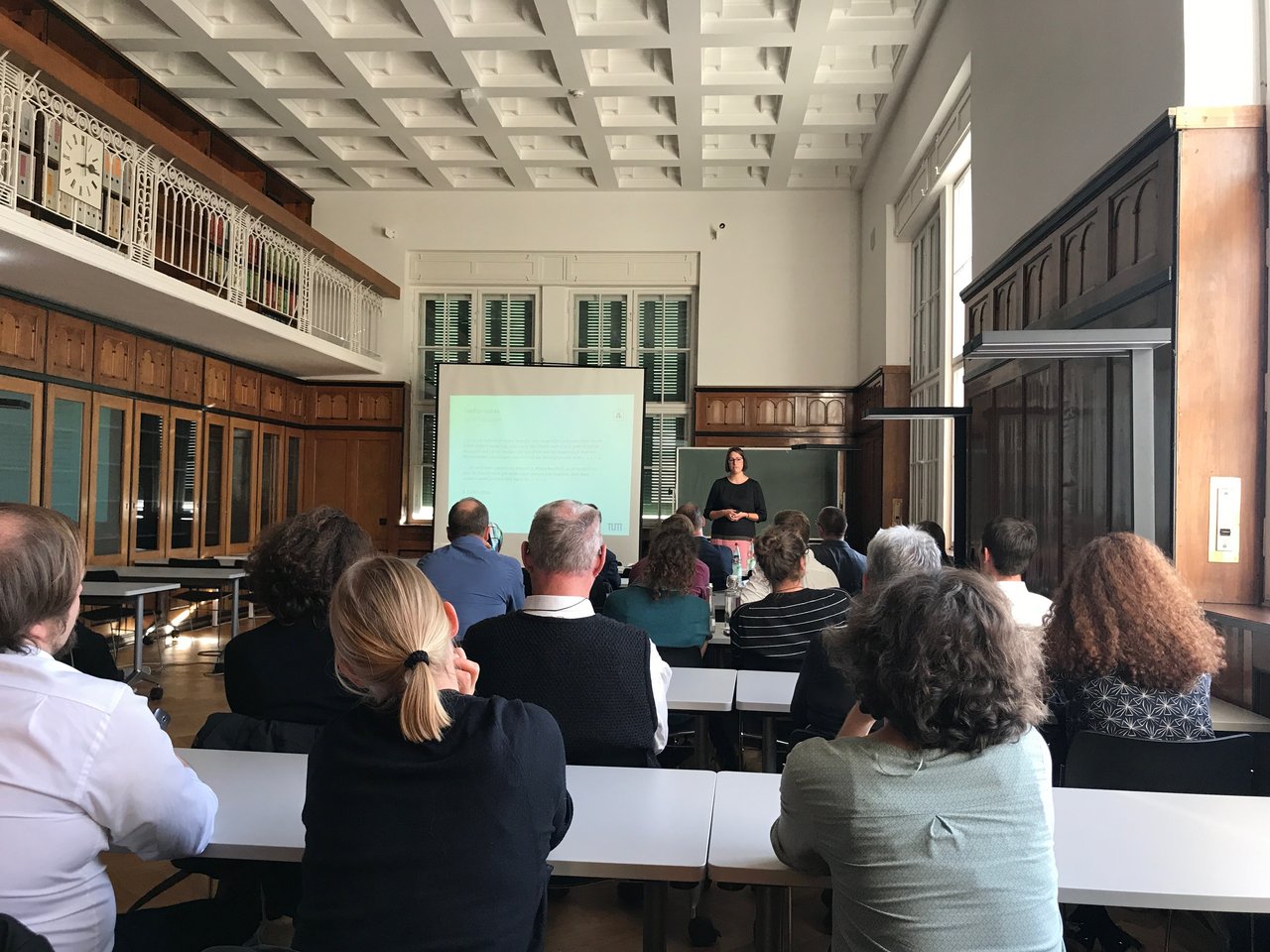
mobil.LAB Doctoral Research Colloquium
The monthly mobil.LAB colloquium proved to be a critical element for supporting an intensive exchange of content and ideas during both phases of the mobil.LAB. Each month, the members of the mobil.LAB gathered to learn about the status of individual research projects and give feedback on all aspects of the research. The colloquium discussions also served as a platform to critically and constructively debate interdisciplinary perspectives in the context of research on topics of sustainable mobility.
This format gave the doctoral dissertations an opportunity to regularly present and discuss their researchh in-depth together with their supervisors, the other fellows and externally invited experts. Occuring on a monthly basis, these colloquia were held at the Technical University of Munich (TUM) and Nürtingen-Geislingen University (HfWU), with research colleagues from both institutions being invited to the join.
Some examples of retreats and workshops organized by and for the mobil.LAB Doctoral Research Group are described below. All of these activities were made possible by the support of the HBS.
Retreat on Creative Communication in Research
On November 4-5th, 2019, the fellows from the second phase of the mobil.LAB met at the Kloster Bernried for a workshop on Creative Communication in Research. The overall goal of this retrreat was to work on the article published in Sustainability on interdisciplinary process in resesearch on topics related to sustainability.
In the interest of this goal and deepening self-reflect content in the article, the retreat focused on two main themes: to explore new ways to communicate idea; and to discuss how to avoid diciplinary gravity when discussing research. To achieve aims, thhe fellows participated in a Creativity in Research Communications Workshop at the Buchheim Museum. They then applied these learnings to reflective discussions on ways to communited better across diciplinary boundaries. Between sessions on the interdisciplinarity and communication, the fellows met in small groups to work on the analysis and framework for the article.
Workshop on Car-Free Cities
On Tuesday, October 12th, 2017, the day before the Opening Reception of the second phase of the mobil.LAB, an internal workshop for the mobil.LAB fellows from the second phase was organized to prepare for their poster presentations delivered at the reception and receive feedback on their work. This workshop held at the Technical University of Municy and was attended by Dr. Helen Carter and Dr. Stephan Klug, the Post-Doc Coordinators from the first and phase, along with the Prof. Dr.-Ing. Gebhard Wulfhorst and Prof. Dr. Sven Kesselring, the Speakers for the second phase.
In addition to discussing the individual research and presentations, the workshop also dedicated time for the research group members to discuss a topic of shared researchh interest: How auhtomobilitilty in cities be reduced? How are car-free cities created?
Research Retreat on Sustainanble Mobilities Cultures
From March 3-4th, 2017, the fellows from the first and second phase joined the Speakers, Coordinator and Affiliated Professors of the mobil.LAB to work on their shared research agenda. This retreat was held at the Georg-von-Vollmar-Akademie, Kochel am See. Overall, thie intent of the retreat was to come a common understanding of the Concept for the second phahse of the mobil.LAB and also discuss the group's research activities in the coming years.
On the first day of the retreat, three fellows from the second phase led a discussion on Mobility Cultures focused on finding a common understanding and consider the limitations of the conncept. In the morning on the second day, the participants worked in small groups to discuss the role of the researcher versus the role of the practioner and then debated the benefits of applied versus basic research. The retreat concluded by bringing together the outcomes from the two themes of the retreat: thhe mobilities culture and the fellows' individual research and our role as researchers.
Over it's decade of activities, the mobil.LAB Doctoral Reserach Group organized many public and scientific events with the support of the Hans Böckler Foundation. Learn more about some of the events organized the mobil.LAB below.
On April 21, 2021, the mobil.LAB hosted a one-day virtual workshop together with the Hans Böckler Foundation and the “mobil.LAB Doctoral Research Group at TUM, the “Sustainable Mobilities” master’s course at the HfWU Nürtingen-Geislingen. This workshop focused on “Regional Perspectives for a Sustainable Mobility Industry. Transformations in Baden-Württemberg and Bavaria" and offered a platform for an exchange between regional professionals, experts and doctoral students researching in the fields of practice of mobility. The speakers invited to contribute to this event were asked to address transformative processes towards sustainable and environmentally-friendly mobility, while taking ecological, economic and social concerns into account.
Our Speaker Prof. Dr. Sven Keselring lead the organization of this workshop. One of the talks given at the workshop was delivered by of our doctoral fellows and their supervisor who serves as affiliated professor of the mobil.LAB and another was given by another affiliated professor.
List of Speakers
„Das Auto in der Verkehrswende: soziologische Deutungen“
Dr. Weert Canzler (WZB, Berlin)
„Für einen Deal zwischen Arbeit und Umwelt: Klimawandel und Gewerkschaften“
Kai Burmeister (IG-Metall Baden-Württemberg)
„Resiliente Lieferketten: Robuste Strategien für die Transformation“
Sylvia Stieler (IMU-Institut, Stuttgart) & Benjamin Frieske (DLR-Institut, Stuttgart)
„Automobilkulturen in Deutschland zwischen (Re)Produktion und Wandel”
Michael Mögele (mobil.LAB, LMU München / HfWU Geislingen) & Prof. Henrike Rau (mobil.LAB, LMU München)
„Zukunftswerkstatt 4.0. Ein Beitrag zur regionalen Innovation“
Prof. Stefan Reindl (mobil.LAB, HfWU Geislingen) & Prof. Benedikt Maier (HfWU Geislingen)
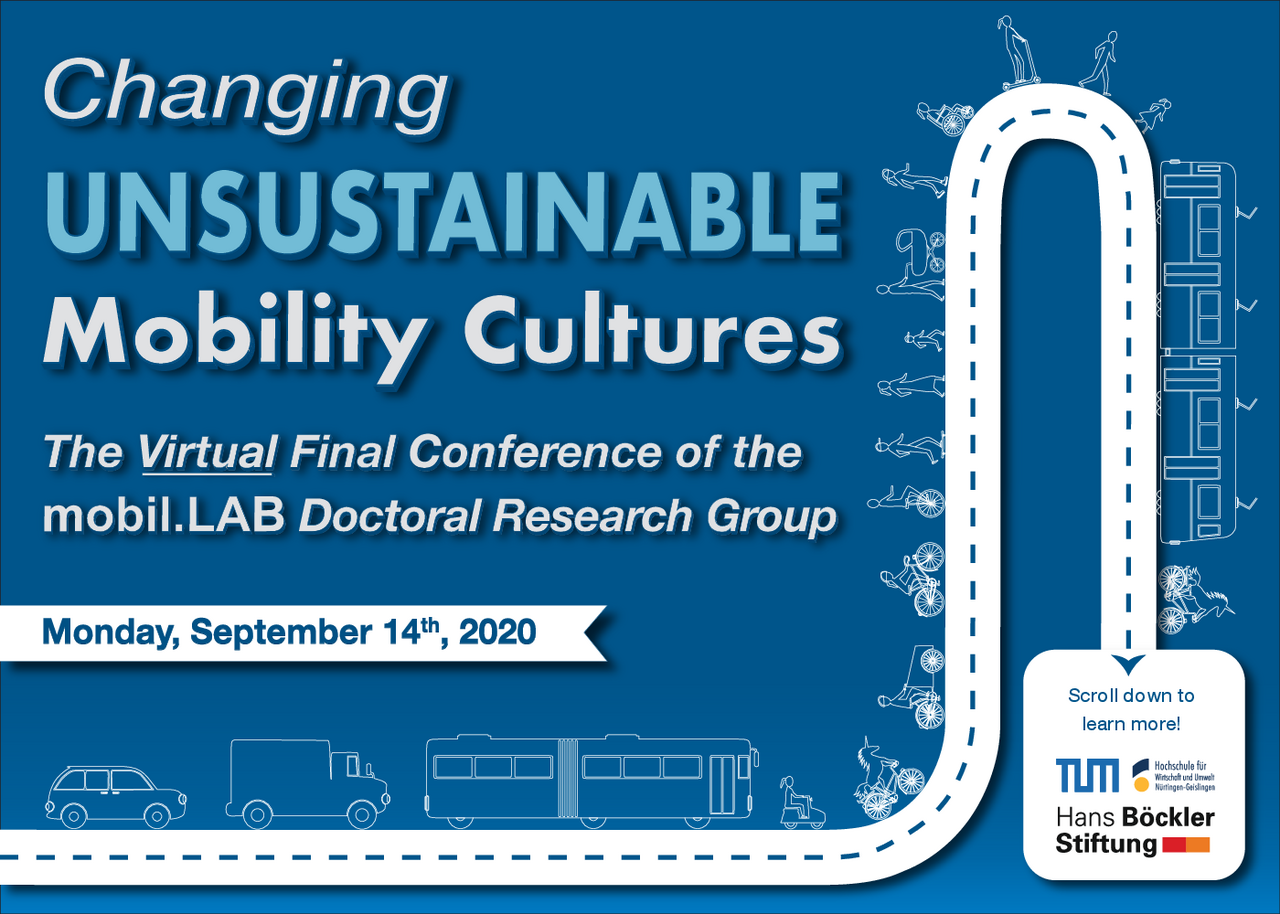
On September 14th, 2020, we gathered online for a virtual Final Conference of the mobil.LAB Doctoral Research Group. Our thirteen mobil.LAB doctoral fellows shared the results from their research projects and enjoyed the day's fruitful discussion on how we might approach Changing Unsustainable Mobility Cultures. The free virtual event was co-financed by the Hans Böckler Foundation and is co-hosted by the Technical University of Munich (TUM) and the Nürtingen-Geislingen University (HfWU).
The Speakers of the mobil.LAB, Prof. Dr.-Ing Gebhard Wulfhorst and Prof. Dr. Sven Kesselring welcomed our attendees from reserachh hand practice A keynote talk from Prof. Dr. Henrike Rau and input given by as Conference Observers by Dr. Justin Spinney and Dr. Jessica Le Bris. Finally, we were joined by four guest moderators and alumni of the mobil.LAB, Dr.-Ing. Benjamin Büttner, Dr.-Ing. Montserrat Miramontes, Dr.-Ing. Matthew Bediako Okrah and Prof. Dr. Dominic Villeneuve.
CONFERENCE SCHEHDULE & MATERIALS
WELCOME SESSION
Introductions from our Speakers:
"Changing Sustainable Mobility Cultures..."
Prof. Dr.-Ing. Gebhard Wulfhorst (slides)
"Sustainable Mobility in Metropolitan Regions: 10 Years of Research"
Prof. Dr. Sven Kesselring (transcript)
Welcome from the Doctoral Fellows:
Tobias Kuttler
Keynote Talk:
"Mobility cultures in transition: Infrastructure, policies, and everyday practices"
Prof. Dr. Henrike Rau (slides)
SESSION I-A:
The boring behaviors of everyday? Understanding how people practice mobility
Moderator: Dr.-Ing. Benjamin Büttner
"Individual lives, shared living: The role of place-based communities in a mobile world"
Julie Magelund (slides)
"Where am I going? How am I going?: Wayfinding in Public Transit"
Anthony Ferri (slides)
"What types of interactions do bicyclists experience in Munich’s bicycle lanes?"
Cat Silva (slides)
SESSION I-B:
D(r)iving into a sustainable future? Analyzing ways to new mobility and automotive concepts
Moderator: Dr.-Ing. Montserrat Miramontes
"Car states in motion: Negotiating mobility in industrial politics"
Michael Mögele (slides)
"New ways to mobility concepts based on biocybernetic systems modelling and simulation"
Gabriele Harrer-Puchner
"System analysis of on-demand mobility services"
Dr.-Ing. Christian Assmann (slides)
SESSION II-A:
Equitable and eco-friendly? Planning tools for sustainable mobility
Moderator: Dr.-Ing. Matthew Bediako Okrah
"The interrelationship between transport, land use and noise"
Nico Kühnel (slides)
"Carbon-based accessibility instruments: visual tools for low carbon mobility options"
Julia Kinigadner (slides)
"Spatial fairness assessment of the allocation of bike-sharing supply"
David Duran Rodas (slides)
"Assessing Pedestrian Impacts of Future Land Use and Transportation Scenarios"
Qin Zhang (slides)
SESSION II-B:
Who’s driving, who’s driven? Exploring shared and automated mobilities
Moderator: Prof. Dr. Dominic Villeneuve
"Non-commercial carsharing: Sharing beyond profit"
Dr. des. Luca Nitschke (slides)
"Automated driving and politics of displacement"
Dr. des. Eriketti Servou (slides)
"Taxi driving in Mumbai: Disruption or business as usual?"
Tobias Kuttler (slides)
CLOSING SESSION
Input from Conference Observers:
Prof. Dr. Justin Spinney
Dr. Jessica Le Bris
Final Words from our Speakers:
Prof. Dr. Sven Kesselring
Prof. Dr.-Ing. Gebhard Wulfhorst
Conferene Organization
Organizing Committee:
Cat Silva (Lead)
Prof. Dr. Gebhard Wulfhorst
Dr. des. Luca Nitschke
Michel Mögele
David Durán Rodas
Design Committee:
Anthony Ferri
Cat Silva
→ Download the conference program flyer here.
The mobil.LAB organized and hosted a PhD course on the theme ‚Doing Mobilities Research‘ from March 5th-7th 2018. This course was held at Georg-von-Vollmar Akademie situated in Kochel am See, Bavaria. We accepted applications from 18 doctoral candidates to join us, including a diverse range of researchers working with mobilities and transport. Each participant submitted an abstract on their research, which they worked on throughout the course through group and individual learning exercises.
Four senior researchers joined from England and Denmark to lead the course, with input from Prof. Dr. Sven Kesselring and Prof. Dr.-Ing. Gebhard Wulfhorst. The course organization was lead by Dr. Helen Carter and all doctoral fellows researching in the mobil.LAB participated the course.
Instructors
Dr. Joe Deville
Lancaster University
Prof. Dr. Malene Freudendal-Pedersen
Roskilde University
Dr. Carlos Lopez-Galviz
Lancaster University
Dr. Justin Spinney
Cardiff University
In 2018, the doctoral fellows in the second phase organized the 9th Annual Conference of the Pegasus Network for Young Researchers in Mobility and Transport Research. The conference focused on the significance, materiality, and issues of “Everyday Mobility Matters”. The intention of this conference was to enable an integrated view of everyday mobility through a lively exchange of research approaches, experiences, and interdisciplinary perspectives. A total of 63 people joined this scientific event which included 25 presentations giving by young researchers working in Germany, 5 mobility-themed global cafés, a poster session with presentations from 9 participants and a fishbowl discussion led by 4 expert speakers.
This conference was organized in collaboration with Dr. phil. Jessica Le Bris, a fellow from the first phase of the mobil.LAB, and was funded with support from the HBS. The scientific sessions were hosted at the Technical University of Munich and a reception was hosted by Green City.
Conference Program
FISHBOWL DISCUSSION - Everyday Mobility and Innovative Solutionns
Moderation:
Jessica Le Bris (GreenCity Projekt GmbH)
Panelists:
Dr. Rauno FuchS
GreenCity Projekt GmbH
Prof. Dr. Monika Popp
LMU München
Dr.-Ing. Lena Sterzer
Planungsreferat München
Dr.-Ing. Gebhard Wulfhorst
TU München
SESSION A1 - Future of Neighbourhood Mobility
Moderation: Eriketti Servou (TU München / mobil.LAB)
Rethinking Parking in Highly Urbanized Neighborhoods? Conceptualization and First Results from a Household Survey in Frankfurt/Main
Franziska Kirschner (Goethe-Universität Frankfurt am Main)
Everyday Mobilities in Co-Housing Communities
Julie Magelund (LMU München / mobil.LAB)
SESSION A2 - Shaping Inclusive Mobility
Moderation: Stefanie Schwerdtfeger (GoetheUniversität Frankfurt am Main)
Mobile Spaces and the Politics of Urban Sustainability and Inclusion in the Global South. Whose Commons are we Talking about?
Tobias Kuttler (TU München / mobil.LAB)
Wohnen und Mobilität Zwischen Fremdbestimmung und Exklusion
Lena Sterzer (TU München / mobil.LAB)
Mind the Gap: Social Sustainability though Transit Wayfinding
Anthony Ferri (TU München / mobil.LAB)
SESSION B1 - New Approaches to Transport Planning
Moderation: Fabian Wenner (TU München)
Veränderungen in der Digitalen Stadt und Darauf Bezogener Governance-Arrangements – am Anwendungsfall Neuer Digital-Gestützter Mobilitätsangebote
Nora Fanderl (Fraunhofer Institute for Industrial Engineering)
Bewertungsverfahren zur Identifizierung von Orten, die eine Nutzung des Umweltverbundes fördern für die Stadt Essen
Jonas Heß (ETH Zurich)
Design of a Sustainability Oriented Mobility-as-aService Framework for the City of Munich
Julian Zöschinger (TU München / Green City)
SESSION C1 - Mobilities Policies in the Making
Moderation: Nadine Pieper (TU Braunschweig)
Aufbruch ins Ungewisse. Policy-Akteure im Politikfeld Elektromobilität
Johannes Thiele (Uni Heidelberg)
Wheels in Motion: A Discourse-Analytical Study of the Transformation of the German Automobile Industry Focusing on Munich and Stuttgart
Michael Mögele (LMU München / mobil.LAB)
Zwischen Fossilen Realitäten und Post-Fossilen Möglichkeiten: Produktion und Vermittlung von Wissen für die Nachhaltige Transformation Urbaner Personenmobilität
Berenike Feldhoff (Westfälische WilhelmsUniversität Münster)
SESSION C2 - Data for Transport Planning and Design
Moderation: Anthony Ferri (TU München / mobil.LAB)
User-Generated Data to Define the Extent of a Tourist Region
Carlos Llorca Garcia (TU München)
Factors Influencing Shared Vehicles Demand: A “Mobility Culture” Approach
David Duran (TU München / mobil.LAB)
Coding Road Users’ Interactions on Streets with Unprotected Bicycle Lanes
Cat Silva (TU München / mobil.LAB)
SESSION D1 - Getting Rid of Car-Dependency
Moderation:Alexandra Bensler (Green City Projekt GmbH)
Mobilitätsdesign als Schlüssel zu nachhaltiger Mobilität?
Andreas Blitz (GoetheUniversität Frankfurt am Main)
Push-Maßnahmen im städtischen Verkehr: Fluch oder doch eher Segen?
Alina Ulrich (Wuppertal Institut)
SESSION D2 - Mobilitätsverhalten
Moderation: Matthias Fuchs (Sächsische Landesbibliothek – Staats- und Universitätsbibliothek Dresden)
Nachhaltige Mobilität im autoreduzierten Quartier: Zwischen Narrativen und gelebten Praktiken: Eine empirische Untersuchung am Beispiel zweier Quartiere in Darmstadt
Sina Selzer (Goethe-Universität Frankfurt am Main)
Living Without a Car: A CanadaFrance Comparative Outlook
Dominic Villeneuve (TU München / mobil.LAB)
SESSION D3 - Tools and Strategies for Mobility Transitions
Moderation: Antoine Habersetzer (Bauhaus Luftfahrt)
Investigating the transition towards autonomous driving within policy-making arenas
Eriketti Servou (TU München / mobil.LAB)
Zwischen Routine und Transformation. Von Automobilen Mobilitätspraktiken, -Logiken und - Strategien zu zukünftigen Mobilitätskonzepten – Ein Akteurszentrierter, Partizipativer Ansatz
Laura Gebhardt (DLR)
SESSION E1 - Mobility Biographies
Moderation: Franziska Kirschner (GoetheUniversität Frankfurt am Main)
Junge Erwachsene in Großstädten: Lebensläufe, Subjektives Wohlbefinden, Gelegenheiten – Alltägliche Aktionsräume?
David Hölzel (Universität Augsburg)
Mobilitätsdynamiken im Kontext von Wissensarbeit: Mobilitätserfordernisse im Spannungsfeld Zwischen Beruf und Privatleben
Manuel Weiß (TU Dortmund)
Heute Hier, Morgen Dort: Die Auswirkungen Residenzieller Multilokalität auf das Verkehrshandeln
Claudia Hille (Fachhochschule Erfurt)
SESSION E2 - Sharing is Caring - Concepts and Policies for Carsharing
Moderation: Cat Silva (TU München / mobil.LAB)
Sharing Beyond Capitalism?: An Exploration into Non-Commercial Sharing
Luca Nitschke (TU München / mobil.LAB)
The Dark and the Light Side of Sharing: A Multilevel Study of Customer Misbehavior and Identification in Carsharing Systems
Nadine Pieper (TU Braunschweig)
POSTER SESSION
Moderation: Cat Silva and Anthony Ferri (TU München / mobil.LAB)
MobileInclusion. Forschung zu Mobilität und sozialer Ausgrenzung
Christoph Aberle (TU Hamburg-Harburg)
„[Ich] finde es einfach super, dass man die Zeit nutzen kann, wenn man Bus fährt.“: Alleinstellungsmerkmale von Wertgeschätzter Fahrtzeit im Urbanen ÖPNV
Alexandra Bensler (Universität Bremen)
Wird eine Gleichberechtigung in der Mobilität des Ländlichen Raumes Durch Neue Mobilitätsformen Finanzierbar?
Matthias Grote (TU Hamburg-Harburg)
Akteure des Etablierten ÖV: Schlüsselfiguren für die Mobilitätswende? Max Reichenbach (Karlsruher Institut für Technologie) Innerbetriebliche Verkehrsnachfrage
Mareike Sigloch (Karlsruher Institut für Technologie)
Bewertung der Aktuellen Radroute Durch die Münchner Altstadt Hinsichtlich einer Gelungenen Radverkehrsplanung
Carolin Stanzl (LMU München)
Potenziale der Mikromobile - Alternative für die Erste- und Letzte Meile im Personen- und Güterverkehr
Jennifer Reinz-Zettler (Bauhaus-Universität Weimar / FH Erfurt)
Effects of High Speed Rail-Induced Accessibility Changes on Urban Development in Germany
Fabian Wenner (TU München)
Bikesharing in Mittelstädten: Handlungsempfehlungen für die Umsetzung eines Fahrradverleihsystems für Berufspendler in Holzminden und Höxter
Benjamin Dally & Sebastian Kühle (Hochschule Ostwestfalen-Lippe)
MOBILITY CAFÉS
Mobilitätscafé zu Transdisziplinärer Mobilitätsforschung
Andreas Blitz, Franziska Kirschner, Stefanie Schwerdtfeger, Sina Selzer (Goethe-Universität Frankfurt am Main)
How do We get CarFree Cities and More Households Living without a Car?
Daniel Baehler (Universität Lausanne)
Die Kommunale Verkehrswende Erfolgreich Gestalten: Ansatzpunkte, Erfolgskriterien und Beispiele aus Städten
Miriam Müller (Wuppertal Institut)
Leben mit der Straße: Verkehrsfläche und Straßenraum Gemeinsam Denken
Julia Tahedl (TU Hamburg-Harburg)
Everyday Publishing Matters: Publikationswege in der Mobilitäts- und Verkehrsforschung Kennen und Nutzen
Matthias Fuchs, Christian Bilz (Sächsische Landesbibliothek – Staats- und Universitätsbibliothek Dresden) & Mathias Begoin (Technische Informationsbibliothek Hannover)
Conference Organization
Organizing Committee
All members second phase of the mobil.LAB contributed
Design Committee
Cat Silva
Anthony Ferri
→ Download the conference program flyer here.
To introduce our second phase of doctoral researchers to the local community of researchers and practitioners, the mobil.LAB held an opening reception and poster session on Wednesday 11th October 2017, 17.00-20.00. Each of the new doctoral fellows in the second phase of the mobil.LAB presented their initial research concepts and discussed future perspectives on developing the work over the course of their studies.
The public opening reception and poster sessionn poster as held at the Technical University of Munich and was attended by our colleagues along with researchers, practitioners and students in the Munich Metropolitan Area.
Poster Presentations
"On-Demand Mobility System: Analyzing the Interaction between Urban Mobility Requirements and On-Demand Mobility Systems - A System Model Approach"
Dr.Ing. Christian Assmann
David Durán Rodas
"Multimodal Accessibility Model for Workplaces: A Framework for Integrated Land Use and Transport Development"
Dr.-Ing. Julia Helen Kinigadner
"Is Co-Housing the Solution to Creating More Sustainable Everyday Life Mobilities?"
Julie Magelund
"Effects of the structural change in the automotive industry on metropolitan regions: A case study comparing Munich and Stuttgart"
Michael Mögele
"Sharing mobilities beyond capitalism?: An exploration into non-commercial sharing practices"
Dr. phil. Luca Nitschke
"Analyzing the socio-technical transition towards autonomous driving: The Examples of the Metropolitan Regions of Munich and Stuttgart"
Dr. phil. Eriketti Servou
"An Observational Analysis of Road Users’ Interactions with Unprotected Bicycle Infrastructure Between Intersections"
Cat Silva
The mobil.LAB held public events to communicate the final results of all the doctoral researchers completing their dissertations in the mobil.LAB. For example, an event was held at the Oscar von Miller Forum on Tuesday 23rd May, where Dr.-Ing. Matthew Okrah and Dr.-Ing. Benjamin Büttner presented their completed work to an audience of researchers and local professionals working in relevant to urban mobility and sustainability.
